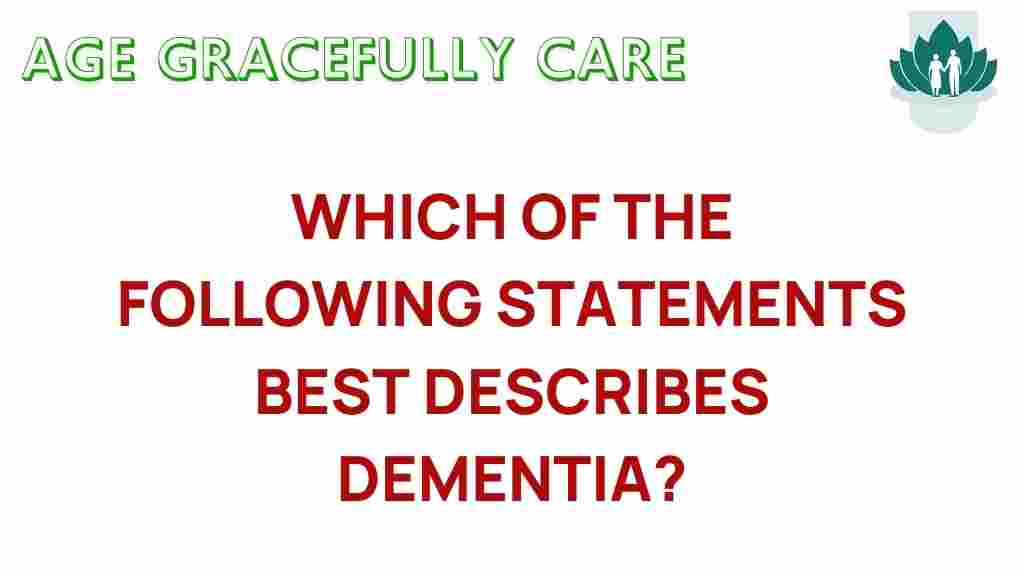Unraveling the Mysteries of Dementia: What You Need to Know
Dementia is a complex condition that affects millions of people worldwide, leading to cognitive decline and significant memory loss. Understanding dementia is crucial for those affected, their families, and caregivers. This article will explore the various aspects of dementia, including its symptoms, diagnosis, treatment options, and the impact on brain health. Whether you are a caregiver or someone concerned about memory loss, this guide aims to provide the essential information you need.
Understanding Dementia and Cognitive Decline
Dementia is an umbrella term for a range of conditions that cause cognitive decline severe enough to interfere with daily life. It is not a specific disease but a general term that describes a variety of symptoms affecting memory, thinking, and social abilities. The most common form of dementia is Alzheimer’s disease, accounting for 60-80% of cases.
Other types of dementia include:
- Vascular dementia: Often caused by strokes or other issues that reduce blood flow to the brain.
- Lewy body dementia: Associated with abnormal protein deposits in the brain.
- Frontotemporal dementia: Affects the frontal and temporal lobes of the brain, impacting personality and behavior.
Common Symptoms of Dementia
Recognizing the symptoms of dementia is vital for early diagnosis and intervention. Some common symptoms include:
- Memory loss, particularly forgetting recently learned information.
- Difficulty in completing familiar tasks, such as managing finances or cooking.
- Confusion with time or place, including losing track of dates and seasons.
- Challenges in understanding visual images and spatial relationships.
- Problems with speaking or writing, such as struggling to find the right words.
- Changes in mood and personality, leading to increased anxiety or depression.
Diagnosis of Dementia
Diagnosing dementia involves a thorough evaluation by healthcare professionals, including:
- Medical history: A detailed account of symptoms, family history, and overall health.
- Physical examination: To rule out other conditions that may cause similar symptoms.
- Cognitive tests: Assessing memory, problem-solving, and attention skills.
- Brain imaging: MRI or CT scans to identify changes in the brain.
Early diagnosis is crucial as it allows for timely interventions that can significantly improve the quality of life for individuals with dementia.
Treatment Options for Dementia
While there is currently no cure for dementia, several treatment options can help manage symptoms and improve brain health. These include:
- Medications: Certain medications can help manage symptoms of Alzheimer’s disease and other dementias. These include:
- Cholinesterase inhibitors: Such as donepezil (Aricept) that can temporarily improve symptoms.
- Memantine: Can help with moderate to severe Alzheimer’s.
- Therapies: Cognitive stimulation therapy and reminiscence therapy can enhance cognitive function and quality of life.
- Lifestyle changes: Regular physical activity, a balanced diet, and social engagement can support brain health.
Caregiving for Individuals with Dementia
Caregiving for someone with dementia can be challenging yet rewarding. Caregivers play a crucial role in managing their loved one’s care and support. Here are some important considerations for effective caregiving:
- Educate yourself: Understanding dementia helps in managing care better.
- Establish routines: Consistent routines can help reduce confusion and anxiety.
- Communicate effectively: Use simple language and be patient. Non-verbal communication can also be effective.
- Seek support: Joining a support group can provide emotional support and practical advice.
Step-by-Step Process for Managing Dementia Care
Managing care for someone with dementia involves a structured approach. Here’s a step-by-step guide:
- Get a diagnosis: Consult with healthcare providers for a comprehensive evaluation.
- Develop a care plan: Work with professionals to create a personalized care plan.
- Implement daily routines: Establish a consistent daily schedule to provide stability.
- Monitor changes: Keep track of any changes in behavior or health and communicate with healthcare providers.
- Take care of yourself: Caregiving can be stressful. Ensure you take breaks and seek help when needed.
Troubleshooting Common Challenges in Dementia Care
Caregivers may face various challenges when caring for someone with dementia. Here are some common issues and tips for addressing them:
- Wandering: To mitigate wandering, ensure that the home is secure. Consider GPS tracking devices.
- Aggression: Stay calm and avoid confrontation. Try to understand the underlying cause of the aggression.
- Refusal to eat: Offer small, frequent meals and their favorite foods. Ensure mealtimes are calm and relaxed.
Promoting Brain Health
Maintaining brain health is vital for everyone, especially for individuals at risk of cognitive decline. Here are some tips to promote brain health:
- Exercise regularly: Physical activity increases blood flow to the brain.
- Eat a balanced diet: Incorporate fruits, vegetables, whole grains, and omega-3 fatty acids.
- Stay socially active: Engage in social activities to reduce feelings of isolation.
- Challenge your brain: Engage in puzzles, reading, and learning new skills.
Resources for Further Information
For more information on dementia, consider exploring the following resources:
- Alzheimer’s Association – A comprehensive resource for information on Alzheimer’s and dementia.
- National Institute on Aging – Offers research and resources on aging and health.
Conclusion
Dementia is a complex condition that requires understanding, patience, and effective management strategies. Recognizing the symptoms early, seeking a proper diagnosis, and implementing appropriate treatments can significantly enhance the quality of life for individuals with dementia. Caregiving for someone with dementia can be challenging, but with the right support and resources, caregivers can provide the necessary care and companionship to their loved ones. By promoting brain health and staying informed about dementia, we can all contribute to a healthier future.
This article is in the category Health and created by AgeGracefullyCare Team
